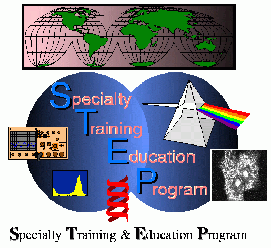 |
 |
 |
 |

[Introduction to STEP]
[Table of Contents]
[STEP HomePage]
[Search for Keyword]
Department of Pathology and Urology Loyola University Medical Center 2160 S. First Avenue Maywood, IL 60153
1. Facilities: A 600 square foot laboratory in the Department of Pathology containing flow and image cytometry instrumentation used primarily for clinical studies. This lab also contains computers for data storage and analysis, and laboratory instrumentation for preparation and staining of cell suspensions and tissue sections (microtome, centrifuges, refrigerator, microscope, hoods, etc. ). In addition, the Urology Research Laboratory, located in the adjacent Hines V.A. Hospital, includes a 750 square foot laboratory and separate office space (200 square feet). This laboratory contains flow and image cytometry instrumentation, computers, complete tissue culture facilities, fluorescence and inverted microscopes. It is completely equipped for tissue and cell preparation, staining, and analysis.
2. Instrumentation:
Pathology Department Laboratory: Coulter XL flow cytometer and a CAS 200 image analysis system. This laboratory also has a BD FAC Scan flow cytometer, which is operated by the Pathology Department Immunophenotyping lab section.
Urology Research Laboratory: Coulter Epics 541 (modified) flow cytometer and an Oncor fluorescence image analysis system.
3. Specialization Areas: Flow cytometric and image analysis of urological malignancies (prostate, bladder, and renal cell cancers). Clinical research studies on human tumor material, including DNA ploidy determinations, tumor proliferation (S-phase and tumor-associated antigen measurements), and analysis of chromosomal gain or loss using FISH. Flow cytometric studies include DNA content plus cytokeratin analysis of bladder washings, analysis of archival tumor samples using DNA content plus antibodies to proliferation associated antigens.
4. Special Opportunities: Isolation of intact cells from fresh human tumors, and isolation of nuclei from archival paraffin-embedded tumor specimens. Techniques for fixation, staining, and flow cytometric analysis of tumor samples. Sample preparation and staining for image analysis of isolated cells, nuclei, or intact tissues using DNA ploidy and cell proliferation markers. Use of fluorescence in situ hybridization analysis (primarily centromeric probes) for determination of numerical gain or loss of specific chromosomes in solid tumors. Each training program or internship will be designed to meet the needs of individual participants.
5. Special Courses Offered: None at this time.
6. Graduate Program: None at this time.
7. Local Accommodations: A Best Western Hotel is located approximately six blocks from Loyola University Medical Center (shuttle bus available). A number of additional hotels are located in Oak Brook, about four miles from the Loyola facility. It is advisable to have a car if these (or other Chicago area) hotels are used.
8. Transportation: Local airports are Chicago/O'Hare (ORD) and Chicago/Midway. Loyola Medical Center is located approximately 12 miles from O'Hare and 8 miles from Midway. Limousine or taxi service is available from either airport for approximately $40-$45. Chicago is also served by bus and rail service. Considering the location of the Medical Center, and the lack of good hotels nearby, it is advisable to rent a car upon arrival at either airport. This provides considerable flexibility for accommodations, and the additional expense (compared with taxi or limo service to and from the airport) is not significantly different.
9. Cost of Internship: A basic rate of $500 for a five-day internship in flow or image cytometry will cover laboratory costs, including reagents and instrumentation time. Internships involving significant amounts of FISH analysis will be higher, due to the cost of commercially obtained FISH reagents. All internships will be designed to meet the needs of individual students, and the cost to the student will be determined in advance based on the exercises chosen. All rates are negotiable. The best times for internships are June-August.
10. Communications:
T. Vincent Shankey, Ph.D. Director of Urology Research Scientific Director Analytical Cytometry Laboratory Department of Urology Loyola University Medical Center 2160 S. First Avenue Maywood, IL 60153 Phone: (708) 216-5102 FAX: (708) 216-6585 E-mail: tshanke@bsd.meddean.luc.edu
 |
 |
 |
 |